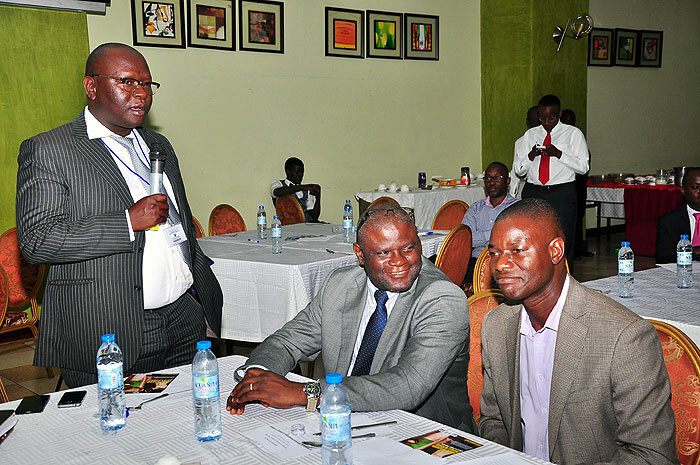'Some Ugandans no longer fear malaria'
"The outcome of the study shows that people fear HIV/AIDs more than malaria because it [the former] has no cure."
KAMPALA - As the country moves towards the elimination of malaria by 2030, a goal most African countries set to achieve as part of sustainable development goal 3, Dr. Jimmy Opigo from the health ministry has raised concern that some Ugandans no longer fear malaria - something he says could hurt the achievement of the goal.
He is the program manager, National Malaria Control Program (NMCP), at the ministry.
Dr. Opigo said the ministry did a study and found that many Ugandans think the disease is a no-risk factor, arguing that it can be cured after all.
"The outcome of the study shows that people fear HIV/AIDs more than malaria because it [the former] has no cure. Some Ugandans think it is okay to get malaria because there is treatment and it is cured, and therefore, they do not care to protect themselves against it," he said.
"But this is a risky perception."
He added: "The fact is, malaria kills faster and more people than HIV/AIDs. There is need for different stakeholders to work together to promote different strategies aimed at eliminating malaria."
Dr. Opigo said there are several misconceptions related to use of mosquito nets, and as thus, some people have abandoned them.
Some people believe are allergic to mosquito nets, that when they sleep under treated mosquito nets, their skins itch or sometimes swell, while others say when they sleep under mosquito nets, they feel very hot, uncomfortable and find it difficult to breathe.
On the other hand, there is the use of misuse of the nets. Some people do not use them for the right purpose of protecting against mosquitoes. Some use them as fishing nets, wedding veils as well as plant and animal shelter.

Dr. Jimmy Opigo addresses participants as the chief of party USAID's malaria action program for districts, Dr. Sam Siduda Gudoi (right) and country director Malaria Consortium, Godfrey Magumba (middle) listen on during a meeting. (Credit: Juliet Kasirye)
"Some people are protecting their plants and animals more than they are protecting their lives. Our lives matter a lot, we need to protect ourselves from this killer disease, most especially by sleeping under treated mosquito nets," said the ministry official.
"To keep away malaria, people must keep their surrounding environments clean, sleep under treated mosquito nets, accept their houses to be sprayed. And in case one gets a fever, he or she should promptly be tested and if tested positive for malaria, one must complete the medication as prescribed."
He was speaking during a national stakeholder's meeting in Kampala on Tuesday.
The meeting organized by the ministry of health under the national malaria control program department aimed at highlighting the progress the country has made in the fight against malaria and the proposed interventions the country and other development partners are undertaking or about to undertake to eliminate malaria in the country.
During the meeting, the national malaria communication campaign was launched.
Public health problem
Statistics from the health ministry show that malaria is still the leading cause of death in Uganda, accounting for over 27% of deaths.
The statistics also show that Uganda has the world's highest malaria incidence, with a rate of 478 cases per 1,000 population per year.
A 2013/2014 report by the parliamentary committee of health showed that 50% of deaths caused by malaria in Uganda are among children below five years.
The 2014 Malaria Indicator Survey may have shown a reduction in the prevalence rate (42%-19%), but the outlook based on reports from hospitals countrywide remains grim.
Prof. Moses Kamya, the dean of school of medicine who also doubles as director of infectious disease research collaboration, said malaria is a public health problem, especially in endangered regions like the northern region.
Giving an example of Tororo district, he said before spraying of houses in 2014, a typical three-year-old child would get three episodes of malaria every year.
"Remember, a typical Ugandan woman has more than three children. This means the parents will spend most of their time in the hospital. When will they work? Productivity is lost, and this explains continuous vicious cycle of poverty. How about the burden of malaria on the economy?"
"To eliminate malaria in this country, it requires a multi-disciplinary approach. For instance, provision of nets and ensuring beneficiaries use them effectively, and promote us of artemisinin-based combination therapy (ACTs) for treating non-severe malaria among other interventions," advised Kamya.
Dr. Sam Siduda Gudoi, Chief of Party, USAID's Malaria Action Program for Districts said ministry of health together with other partners will be distributing over 24 million free mosquito nets starting in December this year till September next year.
He revealed that unlike in the past when the distribution was universal with no specific target groups, this time around, pregnant women who go for antenatal care at health clinics, school going pupils and newly-borns who go to the hospital for immunization for the first time will also get free nets.
Over 550,000 expectant mothers are expected to get nets in about 1700 health facilities, 600,000 nets will be given to school going pupils, estimating to cover about 2000 schools.
Rukia Nakamatte, who works with National Malaria Control Program, ministry of health said countrywide campaigns against malaria are starting soon. The team will traverse different parts of the country teaching people how to use nets effectively.